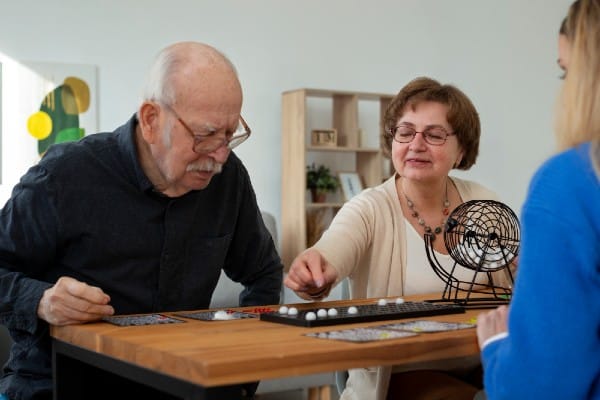Anosognosia and Fear
When aging parents suffering from dementia refuse help, it can be an incredibly frustrating experience. The emotions caregivers face can be overwhelming, including guilt, helplessness, and frustration. Acknowledging these emotions is crucial, as it validates the difficult role caregivers play. When that parent is exhibiting symptoms of dementia, worries for both the individual and the caregiver can skyrocket, further amplifying these emotions.
To manage stress and maintain well-being, caregivers can benefit from simple self-care practices, such as taking brief daily walks or practicing mindfulness. Joining a support group can also offer a sense of community and validation that you’re not alone in this challenging journey.
It is important that we understand that two of the main reasons older adults tend to refuse care and deny the presence of dementia are Anosognosia and fear.
What is Anosognosia?
Anosognosia is the inability to recognize an illness, even when it is clear to others. As dementia damages the brain, a person may truly not realize they have it. This can make an already tough situation even more stressful.
Fear and Denial
Denial is a coping mechanism that can bring comfort and keep fear within arm’s reach. Can you imagine being told your brain is in decline and you will lose the ability to remember those around you? Admitting that you have dementia makes it real, and some of our aging loved ones are not ready to live that reality just yet.
It doesn’t really matter why they are refusing help, although it can help us be more understanding. Whether it is because of fear or anosognosia, the gravity of the situation remains the same: our loved one is refusing help.

Here are five strategies experts recommend to help you approach the situation so your aging loved one can get the assistance and attention they need.
1. Expert Advice Can Help
Sometimes our parents won’t believe something unless it comes from a professional. Getting help from doctors, healthcare professionals, social workers, or even priests or ministers can help smooth out the difficulties you face when your loved one refuses caregiver services.
An expert can explain to them how different therapies will benefit them. Professionals have much more experience than we do, and they can answer any questions you may have. In addition to consulting professionals, consider reaching out to local clinics, Alzheimer’s associations, or community centers. These resources often provide valuable support and guidance, offering caregivers a starting point for professional assistance.
2. Ask Questions
Non-threatening, open-ended questions that require more than a yes-or-no answer can be extremely helpful. This helps provide information about the underlying reasons for resistance or the type of help your loved one thinks they need.
Consider asking questions like, ‘How are you feeling about having help at home?‘ or ‘What worries you the most about getting assistance?’ These can provide valuable insights into their feelings and reservations.
Even though dementia can make it hard for your loved one to express themselves, their need for communication is as strong as ever. Slow down a bit, work at their pace, and see if you can find deeper reasons for why they are resisting help.
3. Prioritize Problems
Assigning appropriate weights to each issue is often an effective way to address multiple problems simultaneously. We need to decide how important each challenge is. Are we looking at a matter of safety or a matter of preference?
An example of a high-priority problem is forgetting to eat. An example of a low-priority problem is wanting to stay up all night. Make a list and organize it from most important to least. Each point can then be assessed regarding the steps that have already been taken and those that are required next.
Caregiving can become a heavy burden, and making a list by priority can help reduce stress.
4. Give Choices
No one likes to feel as if they’re being forced into doing something. Giving your loved one options will allow them to feel they have control over the decisions being made. Let your parents select which day of the week works best for them and what they may like a companion to help with.
It can be hard to admit to a spouse or child that extra help is needed, so don’t be afraid to have a professional caregiver come in to go over the available options.
5. Accept the Situation
The bulldozer approach will only create greater resistance. We have to remember that our loved one has been living independently for the majority of their life. We can spend a lot of energy trying to get them to accept a dementia diagnosis or to try to bully them into getting help.
In the end, it is essential to remember they are adults and want to be responsible for their own decisions. Don’t be afraid to back off for a couple of days (for both of you) to give each other some space.
While patience and empathy are important, it is equally crucial to prioritize safety. If the refusal of care poses an immediate risk to your loved one’s well-being, it’s important to act swiftly.
In a crisis, calling 911 or contacting a local crisis line can provide immediate support. These resources are equipped to handle emergencies and offer guidance on the necessary steps.
Take a break when necessary to build patience before gently readdressing the situation.





